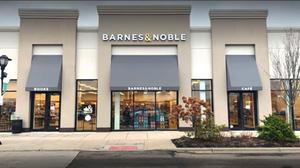 |
|
| Barnes & Noble opened in Deerfield, Ohio, earlier this year. | |
Today's New York Times has a feature about Barnes & Noble entitled "How Barnes & Noble Went from Villain to Hero" with the deck, "To independent booksellers, the enormous chain was once a threat. Now it's vital to their survival. And it's doing well."
Among the points in the article, some quite familiar, some new:
Many in the industry value B&N because of "its unique role in the book ecosystem, where it helps readers discover new titles and publishers stay invested in physical stores, [making] it an essential anchor in a world upended by online sales and a much larger player: Amazon."
Sales at B&N rose 3% in 2021 compared to 2019, the last full year before the pandemic, and book sales are up 14%, as it reemphasized the sale of books over sidelines that often were not book-related, according to CEO James Daunt.
B&N's online sales have risen 35% over pre-pandemic levels and account for about 10% of overall sales. The company is investing more again in the Nook.
B&N's central staff has been reduced by half since Elliott Advisors bought the company in 2019 and since Daunt began shifting many central office responsibilities, including some buying, to B&N's more than 600 stores. Daunt commented: "I get all the glory, but actually what I'm doing is getting out of people's way and letting them run decent bookstores. All the work goes on on the shop floor."
Print books account for 76% of publishers' sales, according to the Association of American Publishers, and more than half of all print books are sold on Amazon.
And among those quoted:
Michael Barnard, owner of Rakestraw Books, Danville, Calif., noted big box competition over the years, including B&N, but said 2021 was Rakestraw's best year ever. "They've been, at times, extremely competitive and hard to have," he told the Times, but "they're the other major part of the industry that is committed to print and to in-person bookselling, and I do think they share some of our challenges. Having said that, I would prefer not to have one just down the road from me."
Oren Teicher, former CEO of the American Booksellers Association, observed, "There was a period where the competition was pretty ugly. Barnes & Noble was perceived as not just the enemy, but as being everything about corporate bookselling that was wrong"--until bookstores developed "a common enemy," Amazon.
Literary agent Jane Dystel: "It would be a disaster if they went out of business. There's a real fear that without this book chain, the print business would be way off."
Dan Simon of Seven Stories Press: "Discovery is so, so important. The more Amazon's market share grows, the less discovery there is overall and the less new voices are going to be heard."
Ellen Adler of the New Press: "It's funny how the industry has evolved so that they are now a good guy. I would say their rehabilitation has been total."

